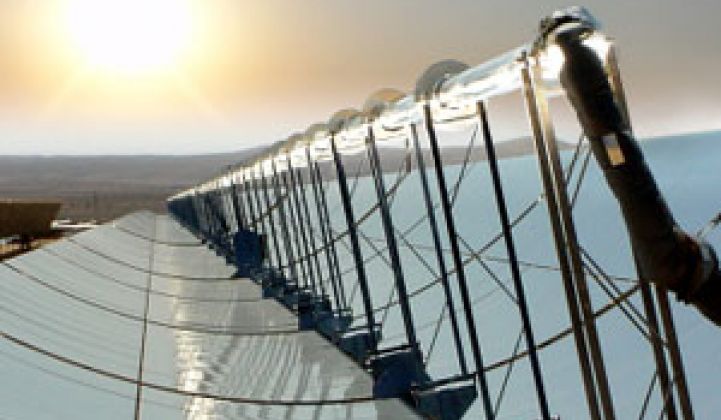German thin-film solar manufacturer Schott Solar called off its much-awaited, much-postponed initial public offering on Wednesday, blaming "dramatic deterioration in international capital market conditions."
The decision puts an end to the company's on-again, off-again flirtation with going public, which began in August with news that the company would seek to raise €500 million ($741 million) through an IPO (see Funding Roundup: Greentech Investors Diversify).
But that was before the bankruptcy of Wall Street investment bank Lehman Brothers, the federal government bailout of insurance giant AIG and other problems that have come amidst an unfolding financial crisis that began in the United States but is now spreading around the globe.
Schott Solar postponed its planned IPO in September, then reversed that decision a week later (see Solar Roundup: Tax Credits Remain in Limbo, Solar Raises Millions). It then extended its share-subscription deadline from Oct. 1 to Wednesday (see Funding Roundup: Investors Back Solar, Car Tech).
Schott Solar had hoped that the passage of renewable energy investment tax credits and a $700 billion financial bailout plan by Congress would calm the markets this week, spokesman Brian Lynch said.
But with the Dow falling below 10,000 for the first time in four years on Tuesday, and another 189 point drop at the close of trading Wednesday, "We've seen that isn't the case," he said.
Wednesday's decision to call off Schott Solar's IPO will be more long lasting than its previous postponements, Lynch said.
"It will be some time until we decide to walk down this path again," he said.
German manufacturer Schott spun off Schott Solar in May, partly as a precursor to the IPO, and remains the sole shareholder of the solar company. (See Schott Spins Out Thin-Film Business.)
The IPO cancellation won't affect Schott Solar's expansion plans, Lynch said.
The company in January announced plans to build a $90 million plant in Albuquerque, N.M. that will make concentrated-solar receivers (see Schott to Build Solar Plant Under New Mexican Sun).
The ongoing financial crisis has led to some concerns that solar manufacturers may have a hard time raising debt to finance new plants, and it has also driven down the shares of several publicly traded solar companies. The result: Companies are more likely turn to private equity firms for the multimillion-dollar investments they need to build factories or power plants (see VCs to Solar Startups: A Deal You Can't Refuse).
Given the good news that solar companies received last week from Congress (see Lawmakers Approve Energy Tax Credits, Bailout), the battering that solar company stocks have taken in the past week is more likely due to broader market turmoil rather than the companies' individual performance, said Jenny Chase, head of solar research for London-based New Energy Finance.
"I think that the fundamentals (for solar companies) have actually improved over the past week," she said, noting that venture capital firms are still investing at a record clip in solar companies (see Greentech Investments See Record 3Q).



